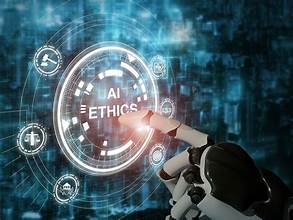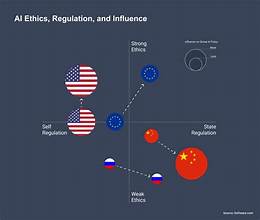
Artificial Intelligence (AI) is transforming various sectors, from healthcare to finance, but its rapid development has sparked significant ethical and regulatory discussions. As AI systems become more sophisticated, addressing their ethical implications has become a pressing concern. New regulations are emerging to ensure that AI technologies are used responsibly and transparently. This article explores the current landscape of AI ethics and how new regulations are shaping the future of artificial intelligence.
Understanding AI Ethics
AI ethics encompasses a broad range of concerns, including bias, privacy, accountability, and the potential for misuse. As AI systems become more integrated into daily life, it’s crucial to address these issues to prevent harm and promote fairness.
- Bias and Fairness: AI systems can inadvertently perpetuate biases present in their training data, leading to unfair outcomes. For instance, biased algorithms in hiring tools can result in discrimination against certain groups. Ensuring fairness in AI involves developing techniques to detect and mitigate biases and designing systems that promote equity.
- Privacy: AI systems often require vast amounts of data, raising concerns about data privacy. Ensuring that AI respects individual privacy involves implementing robust data protection measures and transparent data usage policies.
- Accountability: Determining responsibility when AI systems cause harm or make errors is complex. Clear accountability frameworks are necessary to address issues related to AI-driven decisions and ensure that affected parties have avenues for redress.
- Misuse and Security: AI technologies can be used maliciously, such as in the creation of deepfakes or automated cyberattacks. Developing safeguards to prevent misuse and enhance security is crucial for maintaining trust in AI systems.
The Role of New Regulations
To address these ethical concerns, various jurisdictions are introducing new regulations and guidelines. These regulations aim to provide a structured approach to managing AI technologies and ensuring they align with ethical principles.
- The European Union’s AI Act: The EU has been at the forefront of AI regulation with the proposed AI Act. This comprehensive framework categorizes AI systems based on their risk levels and imposes stricter requirements for high-risk applications. For instance, AI systems used in critical sectors like healthcare and transportation must undergo rigorous assessments to ensure safety and compliance with ethical standards.
- The United States’ Approach: In the US, AI regulation is evolving through a combination of federal guidelines and state-level initiatives. Agencies like the Federal Trade Commission (FTC) are developing guidelines to address transparency and fairness in AI applications. Additionally, state laws, such as California’s Consumer Privacy Act (CCPA), are influencing how AI systems handle personal data.
- Global Initiatives: Beyond regional regulations, global initiatives like the OECD’s Principles on AI and the United Nations’ AI Ethics Guidelines are shaping international norms. These initiatives promote principles such as transparency, accountability, and inclusiveness in AI development and deployment.
How Regulations are Shaping the Future of AI
New regulations are not only addressing existing ethical issues but also influencing the direction of AI development and deployment.
- Promoting Transparency: Regulations are pushing for greater transparency in AI systems, including clearer explanations of how algorithms work and how decisions are made. This transparency helps build trust and allows users to understand and challenge AI-driven decisions.
- Encouraging Fairness: By setting standards for fairness and non-discrimination, regulations are driving the development of more equitable AI systems. This includes requiring regular audits for bias and mandating diverse training data to ensure AI systems serve all individuals fairly.
- Strengthening Privacy Protection: Regulations are reinforcing privacy protections by establishing guidelines for data collection, storage, and usage. This includes implementing privacy-by-design principles and ensuring that individuals have control over their personal data.
- Enhancing Accountability: New regulations are establishing clearer accountability mechanisms, including requirements for documentation and reporting on AI systems’ performance and impact. This ensures that developers and organizations are held responsible for the outcomes of their AI systems.
- Encouraging Innovation: While regulations aim to mitigate risks, they also create a framework that fosters responsible innovation. By setting clear standards, regulations provide a stable environment for AI development, encouraging developers to create ethical and impactful technologies.
Challenges and Future Directions
While new regulations are a step in the right direction, several challenges remain. Balancing innovation with regulation is crucial to avoid stifling technological advancement. Additionally, ensuring that regulations are adaptable to rapid technological changes and addressing global disparities in AI governance are ongoing concerns.
Future directions in AI ethics and regulation may include:
- International Collaboration: Greater international cooperation is needed to harmonize regulations and address global AI challenges effectively.
- Adaptive Frameworks: Regulations must be flexible and adaptable to keep pace with evolving AI technologies and ethical considerations.
- Public Engagement: Engaging the public in discussions about AI ethics and regulation can help ensure that diverse perspectives are considered and that regulations reflect societal values.
Conclusion
As AI continues to advance, navigating its ethical implications is crucial for ensuring its responsible use. New regulations are playing a vital role in shaping the future of AI by addressing key ethical concerns, promoting transparency, fairness, and accountability, and encouraging responsible innovation. By understanding and engaging with these regulations, stakeholders can contribute to the development of AI technologies that benefit society while upholding ethical standards.








